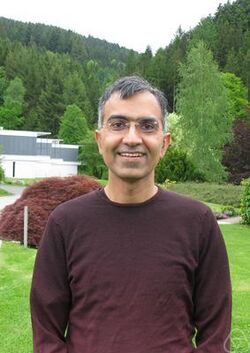Biography:Sanjeev Arora
Sanjeev Arora | |
|---|---|
 Arora at Oberwolfach, 2010 | |
| Born | January 1968 (age 58) |
| Citizenship | United States [1] |
| Alma mater | SB: Massachusetts Institute of Technology PhD: UC Berkeley |
| Known for | Probabilistically checkable proofs PCP theorem |
| Scientific career | |
| Fields | Theoretical computer science |
| Institutions | Princeton University |
| Thesis | Probabilistic checking of proofs and the hardness of approximation problems. (1994) |
| Doctoral advisor | Umesh Vazirani |
| Doctoral students | Subhash Khot, Elad Hazan |
Sanjeev Arora (born January 1968) is an Indian American theoretical computer scientist.
Life
He was a visiting scholar at the Institute for Advanced Study in 2002–03.[2]
In 2008 he was inducted as a Fellow of the Association for Computing Machinery.[3] In 2011 he was awarded the ACM Infosys Foundation Award (now renamed ACM Prize in Computing), given to mid-career researchers in Computer Science. He is a two time recipient of the Gödel Prize (2001 & 2010). Arora has been awarded the Fulkerson Prize for 2012 for his work on improving the approximation ratio for graph separators and related problems from to (jointly with Satish Rao and Umesh Vazirani).[4] In 2012 he became a Simons Investigator.[5] Arora was elected in 2015 to the American Academy of Arts and Sciences and in 2018 to the National Academy of Science.[6] He was a plenary speaker at the 2018 International Congress of Mathematicians.[7]
He is a coauthor (with Boaz Barak) of the book Computational Complexity: A Modern Approach. He is a founder, and on the Executive Board, of Princeton's Center for Computational Intractability.[8] He and his coauthors have argued that certain financial products are associated with computational asymmetry, which under certain conditions may lead to market instability.[9]
Books
- Arora, Sanjeev; Barak, Boaz (2009). Computational complexity: a modern approach. Cambridge University Press. ISBN 978-0-521-42426-4. OCLC 286431654.
References
- ↑ 1.0 1.1 "Sanjeev Arora". http://www.cs.princeton.edu/~arora/bio.html.
- ↑ Institute for Advanced Study: A Community of Scholars
- ↑ ACM: Fellows Award / Sanjeev Arora
- ↑ Arora, Sanjeev; Rao, Satish; Vazirani, Umesh (2009). "Expander flows, geometric embeddings and graph partitioning". Journal of the ACM 56: 1–37. doi:10.1145/1502793.1502794.
- ↑ Simons Investigators Awardees, The Simons Foundation
- ↑ "Professor Sanjeev Arora Elected to the National Academy of Sciences - Computer Science Department at Princeton University". https://www.cs.princeton.edu/news/professor-sanjeev-arora-elected-national-academy-sciences.
- ↑ "Sanjeev Arora". https://www.cs.princeton.edu/~arora/bio.html.
- ↑ "Video Archive". http://intractability.princeton.edu/.
- ↑ Arora, S, Barak, B, Brunnemeier, M 2011 "Computational Complexity and Information Asymmetry in Financial Products" Communications of the ACM, Issue 5 see FAQ
External links
